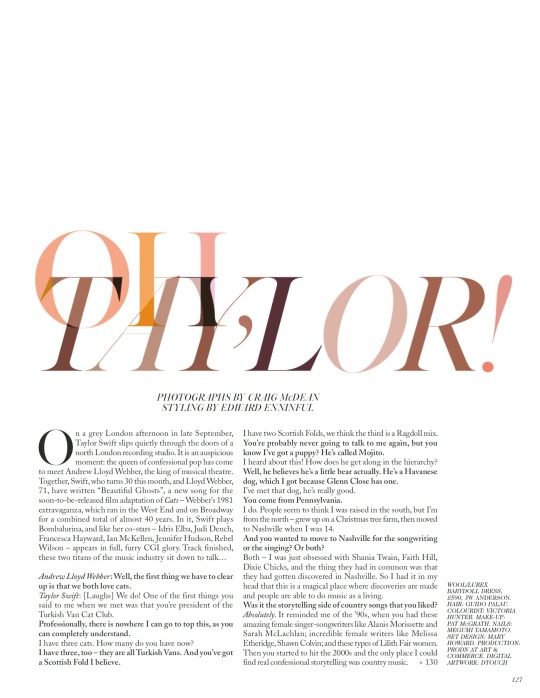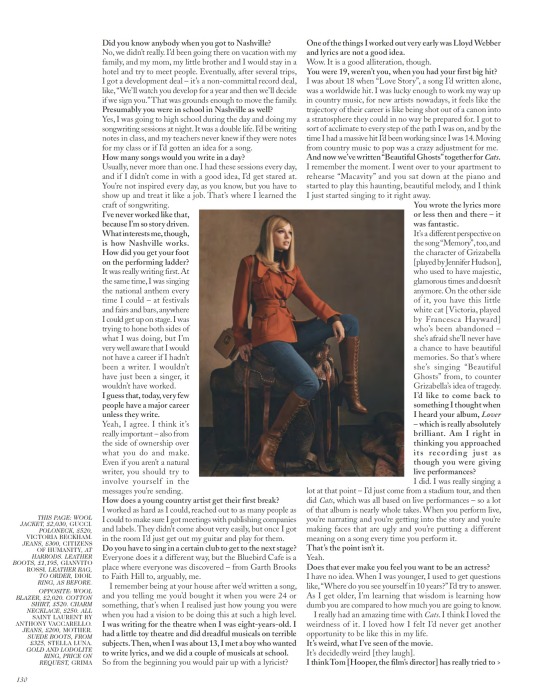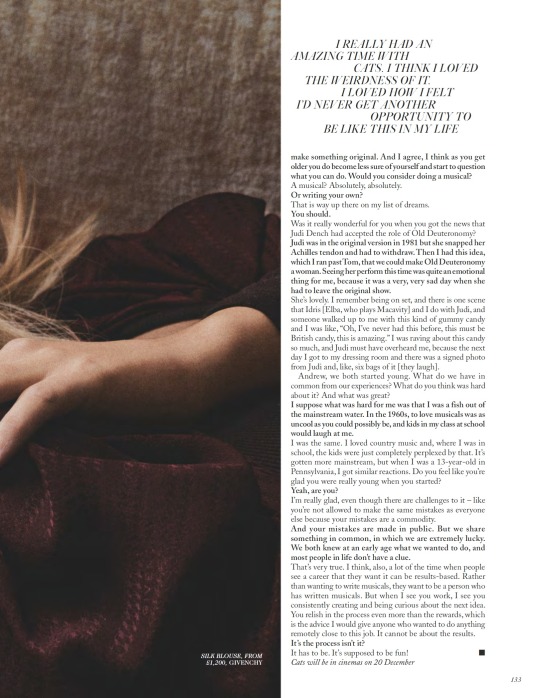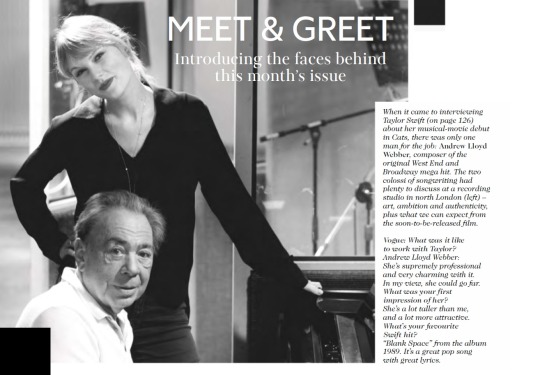#she’s morissette and etheridge level
Explore tagged Tumblr posts
Text
The Prophecy. Fuck me - the composition, the structure is top tier! This woman is fucking fantastic!
She makes all the other pop girls look like amateurs. I’m just in awe of her expertise in songwriting arrangement. The way she combines the lyrics with the melody and just the cleverness of that fusion.
I feel kind of sad because I know so many people won’t hear these songs on the extended version of the album. But they’re honestly some of her very best.
#taylor swift#the tortured poets department#the anthology#the prophecy#she’s morissette and etheridge level#one of the best songwriters in history#this woman can command an entire auditorium with just an acoustic guitar and her vocals#because her songs are that fucking good#please do not skip on the anthology songs
2 notes
·
View notes
Photo




OH, TAYLOR! Taylor Swift On Side-Stepping Into Acting, Owning What You Make & Loving The “Weirdness” Of Cats
On a grey London afternoon in late September, Taylor Swift slips quietly through the doors of a north London recording studio. It is an auspicious moment: the queen of confessional pop has come to meet Andrew Lloyd Webber, the king of musical theatre. Together, Swift, who turns 30 this month, and Lloyd Webber, 71, have written “Beautiful Ghosts”, a new song for the soon-to-be-released film adaptation of Cats – Webber’s 1981 extravaganza, which ran in the West End and on Broadway for a combined total of almost 40 years. In it, Swift plays Bombalurina, and like her co-stars – Idris Elba, Judi Dench, Francesca Hayward, Ian McKellen, Jennifer Hudson, Rebel Wilson – appears in full, furry CGI glory. Track finished, these two titans of the music industry sit down to talk…
Andrew Lloyd Webber: Well, the first thing we have to clear up is that we both love cats. Taylor Swift: [Laughs] We do! One of the first things you said to me when we met was that you’re president of the Turkish Van Cat Club. ALW: Professionally, there is nowhere I can go to top this, as you can completely understand. TS: I have three cats. How many do you have now? ALW: I have three, too – they are all Turkish Vans. And you’ve got a Scottish Fold I believe. TS: I have two Scottish Folds, we think the third is a Ragdoll mix. ALW: You’re probably never going to talk to me again, but you know I’ve got a puppy? He’s called Mojito. TS: I heard about this! How does he get along in the hierarchy? ALW: Well, he believes he’s a little bear actually. He’s a Havanese dog, which I got because Glenn Close has one. TS: I’ve met that dog, he’s really good. ALW: You come from Pennsylvania. TS: I do. People seem to think I was raised in the south, but I’m from the north – grew up on a Christmas tree farm, then moved to Nashville when I was 14. ALW: And you wanted to move to Nashville for the songwriting or the singing? Or both? TS: Both – I was just obsessed with Shania Twain, Faith Hill, Dixie Chicks, and the thing they had in common was that they had gotten discovered in Nashville. So I had it in my head that this is a magical place where discoveries are made and people are able to do music as a living. ALW: Was it the storytelling side of country songs that you liked? Absolutely. It reminded me of the ’90s, when you had these amazing female singer-songwriters like Alanis Morissette and Sarah McLachlan; incredible female writers like Melissa Etheridge, Shawn Colvin; and these types of Lilith Fair women. Then you started to hit the 2000s and the only place I could find real confessional storytelling was country music. ALW: Did you know anybody when you got to Nashville? TS: No, we didn’t really. I’d been going there on vacation with my family, and my mom, my little brother and I would stay in a hotel and try to meet people. Eventually, after several trips, I got a development deal – it’s a non-committal record deal, like, “We’ll watch you develop for a year and then we’ll decide if we sign you.” That was grounds enough to move the family. ALW: Presumably you were in school in Nashville as well? TS: Yes, I was going to high school during the day and doing my songwriting sessions at night. It was a double life. I’d be writing notes in class, and my teachers never knew if they were notes for my class or if I’d gotten an idea for a song. ALW: How many songs would you write in a day? TS: Usually, never more than one. I had these sessions every day, and if I didn’t come in with a good idea, I’d get stared at. You’re not inspired every day, as you know, but you have to show up and treat it like a job. That’s where I learned the craft of songwriting. ALW: I’ve never worked like that, because I’m so story driven. What interests me, though, is how Nashville works. How did you get your foot on the performing ladder? TS: It was really writing first. At the same time, I was singing the national anthem every time I could – at festivals and fairs and bars, anywhere I could get up on stage. I was trying to hone both sides of what I was doing, but I’m very well aware that I would not have a career if I hadn’t been a writer. I wouldn’t have just been a singer, it wouldn’t have worked. ALW: I guess that, today, very few people have a major career unless they write. TS: Yeah, I agree. I think it’s really important – also from the side of ownership over what you do and make. Even if you aren’t a natural writer, you should try to involve yourself in the messages you’re sending. ALW: How does a young country artist get their first break? TS: I worked as hard as I could, reached out to as many people as I could to make sure I got meetings with publishing companies and labels. They didn’t come about very easily, but once I got in the room I’d just get out my guitar and play for them. ALW: Do you have to sing in a certain club to get to the next stage? TS: Everyone does it a different way, but the Bluebird Cafe is a place where everyone was discovered – from Garth Brooks to Faith Hill to, arguably, me. I remember being at your house after we’d written a song, and you telling me you’d bought it when you were 24 or something, that’s when I realised just how young you were when you had a vision to be doing this at such a high level. ALW: I was writing for the theatre when I was eight-years-old. I had a little toy theatre and did dreadful musicals on terrible subjects. Then, when I was about 13, I met a boy who wanted to write lyrics, and we did a couple of musicals at school. TS: So from the beginning you would pair up with a lyricist? ALW: One of the things I worked out very early was Lloyd Webber and lyrics are not a good idea. TS: Wow. It is a good alliteration, though. ALW: You were 19, weren’t you, when you had your first big hit? TS: I was about 18 when “Love Story”, a song I’d written alone, was a worldwide hit. I was lucky enough to work my way up in country music, for new artists nowadays, it feels like the trajectory of their career is like being shot out of a canon into a stratosphere they could in no way be prepared for. I got to sort of acclimate to every step of the path I was on, and by the time I had a massive hit I’d been working since I was 14. Moving from country music to pop was a crazy adjustment for me. ALW: And now we’ve written “Beautiful Ghosts” together for Cats. TS: I remember the moment. I went over to your apartment to rehearse “Macavity” and you sat down at the piano and started to play this haunting, beautiful melody, and I think I just started singing to it right away. ALW: You wrote the lyrics more or less then and there – it was fantastic. TS: It’s a different perspective on the song “Memory”, too, and the character of Grizabella [played by Jennifer Hudson], who used to have majestic, glamorous times and doesn’t anymore. On the other side of it, you have this little white cat [Victoria, played by Francesca Hayward] who’s been abandoned – she’s afraid she’ll never have a chance to have beautiful memories. So that’s where she’s singing “Beautiful Ghosts” from, to counter Grizabella’s idea of tragedy. ALW: I’d like to come back to something I thought when I heard your album, Lover – which is really absolutely brilliant. Am I right in thinking you approached its recording just as though you were giving live performances? TS: I did. I was really singing a lot at that point – I’d just come from a stadium tour, and then did Cats, which was all based on live performances – so a lot of that album is nearly whole takes. When you perform live, you’re narrating and you’re getting into the story and you’re making faces that are ugly and you’re putting a different meaning on a song every time you perform it. ALW: That’s the point isn’t it. TS: Yeah. ALW: Does that ever make you feel you want to be an actress? TS: I have no idea. When I was younger, I used to get questions like, “Where do you see yourself in 10 years?” I’d try to answer. As I get older, I’m learning that wisdom is learning how dumb you are compared to how much you are going to know. I really had an amazing time with Cats. I think I loved the weirdness of it. I loved how I felt I’d never get another opportunity to be like this in my life. ALW: It’s weird, what I’ve seen of the movie. TS: It’s decidedly weird [they laugh]. ALW: I think Tom [Hooper, the film’s director] has really tried to make something original. And I agree, I think as you get older you do become less sure of yourself and start to question what you can do. Would you consider doing a musical? TS: A musical? Absolutely, absolutely. ALW: Or writing your own? TS: That is way up there on my list of dreams. ALW: You should. TS: Was it really wonderful for you when you got the news that Judi Dench had accepted the role of Old Deuteronomy? ALW: Judi was in the original version in 1981 but she snapped her Achilles tendon and had to withdraw. Then I had this idea, which I ran past Tom, that we could make Old Deuteronomy a woman. Seeing her perform this time was quite an emotional thing for me, because it was a very, very sad day when she had to leave the original show. TS: She’s lovely. I remember being on set, and there is one scene that Idris [Elba, who plays Macavity] and I do with Judi, and someone walked up to me with this kind of gummy candy and I was like, “Oh, I’ve never had this before, this must be British candy, this is amazing.” I was raving about this candy so much, and Judi must have overheard me, because the next day I got to my dressing room and there was a signed photo from Judi and, like, six bags of it [they laugh]. Andrew, we both started young. What do we have in common from our experiences? What do you think was hard about it? And what was great? ALW: I suppose what was hard for me was that I was a fish out of the mainstream water. In the 1960s, to love musicals was as uncool as you could possibly be, and kids in my class at school would laugh at me. TS: I was the same. I loved country music and, where I was in school, the kids were just completely perplexed by that. It’s gotten more mainstream, but when I was a 13-year-old in Pennsylvania, I got similar reactions. Do you feel like you’re glad you were really young when you started? ALW: Yeah, are you? TS: I’m really glad, even though there are challenges to it – like you’re not allowed to make the same mistakes as everyone else because your mistakes are a commodity. ALW: And your mistakes are made in public. But we share something in common, in which we are extremely lucky. We both knew at an early age what we wanted to do, and most people in life don’t have a clue. TS: That’s very true. I think, also, a lot of the time when people see a career that they want it can be results-based. Rather than wanting to write musicals, they want to be a person who has written musicals. But when I see you work, I see you consistently creating and being curious about the next idea. You relish in the process even more than the rewards, which is the advice I would give anyone who wanted to do anything remotely close to this job. It cannot be about the results. ALW: It’s the process isn’t it? TS: It has to be. It’s supposed to be fun!
MEET & GREET: Introducing the faces behind this month’s issue
When it came to interviewing Taylor Swift about her musical-movie debut in Cats, there was only one man for the job: Andrew Lloyd Webber, composer of the original West End and Broadway mega hit. The two colossi of songwriting had plenty to discuss at a recording studio in north London – art, ambition and authenticity, plus what we can expect from the soon-to-be-released film.
Vogue: What was it like to work with Taylor? Andrew Lloyd Webber: She’s supremely professional and very charming with it. In my view, she could go far. Vogue: What was your first impression of her? ALW: She’s a lot taller than me, and a lot more attractive. Vogue: What’s your favourite Swift hit? ALW: “Blank Space” from the album 1989. It’s a great pop song with great lyrics.
979 notes
·
View notes